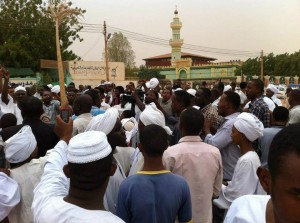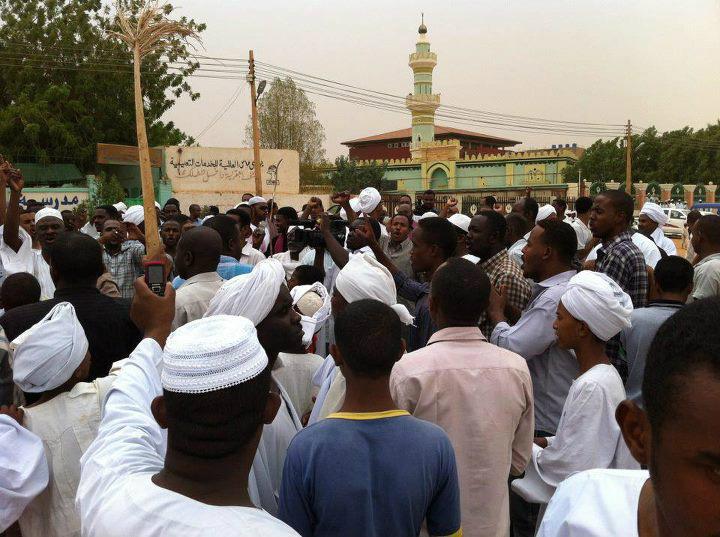 Sudanese officials should fully respect the right of citizens to freedom of expression and peaceful assembly, said the Cairo Institute for Human Rights Studies on Wednesday, June 27.
Sudanese officials should fully respect the right of citizens to freedom of expression and peaceful assembly, said the Cairo Institute for Human Rights Studies on Wednesday, June 27.
Since June 16, 2012, and continuing throughout the past week, student demonstrations have erupted from Khartoum University and spread throughout Khartoum state and other areas of the country, protesting against the austerity measures recently announced by the Sudanese government, including an end to energy subsidies and the resulting rise in food prices. Local residents and students from other universities have joined the demonstrations, and protestors have increased their demands to calling for the fall of the President Bashir’s regime and the establishment of democratic governance.
As in previous crackdowns on pro-democracy protests, Sudanese police forces and the National Intelligence and Security Services (NISS) have responded to this recent wave with zero tolerance, denying Sudanese citizens their right to freedom of assembly by beating demonstrators with clubs and firing teargas, which has led to dozens of injuries. The appearance of pro-government “thugs” dressed in civilian clothing and armed with clubs and knives to harass protestors has also been reported by rights groups in Khartoum. Some reports even claim that security forces in isolated cases have opened fire on protestors, alleging that at least one youth sustained bullet wounds to his limbs during a protest on Friday, June 22.
As part of this crackdown, dozens of students and youth activists have been temporarily arrested over the past several days for being present at the sites of protests, and ill-treatment while in detention is often reported. However, only a few have been brought to trial, and some have been sentenced to lashes for their participation in protests while other trials have been postponed until later dates.
NISS forces have recently raided homes and offices to arbitrarily arrest known activists. On June 19, 40 activists from various peaceful youth movements were arrested by NISS forces from the offices of HAQ, a political opposition party; they were held in an unknown location until they were released early the next morning. Mohamed Boushi Alim and Siddique Tawer, both active Baath Party members, were also arrested from their homes in the early morning on June 20 and 23, respectively. Furthermore, three members of the opposition National Umma Party were arrested by NISS forces on June 24, including a member of the party’s political bureau, Adam Gerier. The same day, NISS ordered the party to cease all activities at its headquarters.
It is concerning that the Sudanese government has censored national media coverage of these events and further targeted national and international journalists who have reported on the protests. On June 21, Sudanese blogger Maha El-Sanousi and Egyptian journalist Salma El-Wardani, who reports for Bloomberg, were both arrested outside the University of Khartoum while covering a protest there. Both were released later the same day, but El-Wardani was deported on June 26 after she requested to renew her withdrawn media accreditation and refused to stop covering the protests. El-Sanousi was again arrested from her home in the early hours of June 27, when her house was raided by 12 NISS agents, two of them armed. Although she was released hours later, her laptop and phone were confiscated and have not been returned, and she has been ordered to return to NISS headquarters on June 28. On June 23, Simon Martelli, resident correspondent with AFP, was arrested while talking with student protestors and taking pictures outside the University; he was detained for twelve hours. Prominent Sudanese video blogger Nagla Sid Ahmed has also been summoned for questioning by NISS on June 20, 21, and 24, presumably to keep her from covering the protests. In addition to those who remain in custody, the whereabouts of online activist Usama Mohamed remain unknown after he was forcibly disappeared on Friday, June 22, following an interview he gave with Al-Jazeera English regarding his intentions to participate in protests.
It has also been reported that Internet access has been temporarily blocked in areas affected by demonstrations.
These demonstrations come as the latest wave of a pro-democracy protest movement in Sudan which began in January, 2011. It is important to note that Sudan has suffered from a weakening currency and rising food and fuel prices for several years, and the latest austerity measures come as an attempt to close the country’s $2.4 billion deficit, even as President Bashir’s government continues to exploit the country’s resources to attack neighboring countries. Moreover, President Bashir and some of his current ministers not only have a decades-long history of brutally repressing all opposition and even local populations in the Eastern, Central, and Western parts of the country; the International Criminal Court has also issued warrants for their arrest based on charges of having committed genocide, war crimes, and crimes against humanity in Darfur.
In light of recent orders made by the Sudanese authorities to police forces to deal “firmly” with protests, which they described as “riots and sabotage,” CIHRS expresses its concern about the ongoing violations currently taking place against anti-government demonstrators. Moreover, given the oppressive record of President Bashir’s government and the historic partiality of the Sudanese judicial system, violations such as arbitrary arrest and torture continue to be likely.
Therefore, CIHRS calls upon the Sudanese authorities to immediately release all political prisoners, including prisoners of conscience and those held merely for their participation in protests. CIHRS emphasizes that protestors should be allowed to exercise their rights to free expression and assembly and calls upon the Sudanese authorities to instruct police and security forces to refrain from violent action against peaceful demonstrators and to allow opposition members to peacefully express their opinions without being targeted with negative consequences.
Share this Post

